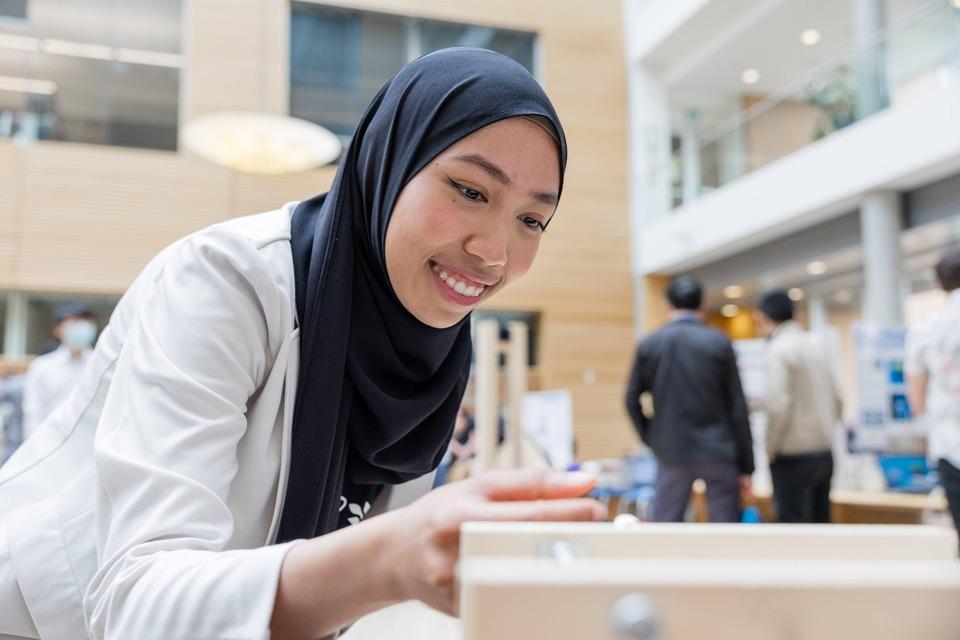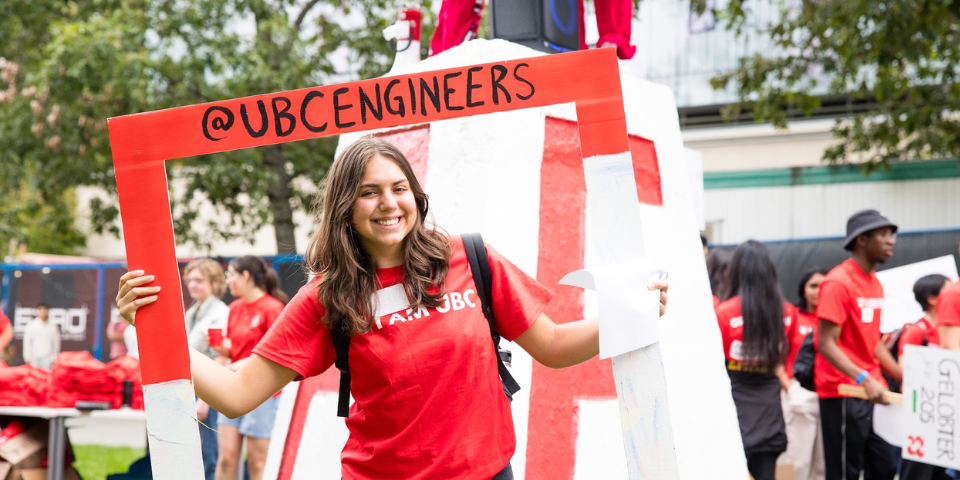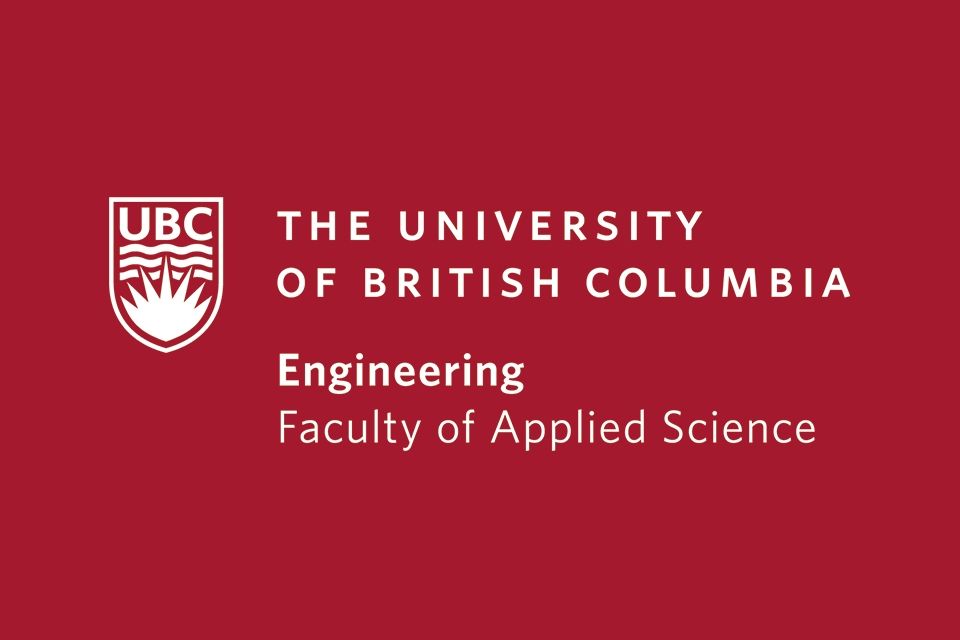
If you are a “big idea” person with the drive to take a concept through design, analysis and prototyping—then mechanical engineering could be where you belong. Mechanical engineering is a diverse field that specializes in the analysis, design, production and maintenance of any system involving movement and energy. Mechanical engineers are in high demand in a wide range of industries, designing machines like robots, aircrafts, and devices for the human body, to working on solutions to today’s issues like developing clean energy technology or reducing greenhouse gas emissions.
Encompassing a broad range of fields, mechanical engineering is a practical, hands-on discipline.
At UBC’s Mechanical Engineering program, you’ll begin by mastering the fundamentals, building a knowledge base in solid mechanics, fluid mechanics, dynamics, thermodynamics, vibrations, heat transfer, controls and design. You can also delve deeper into areas you are passionate about, such as biomechanics, aerospace, robotics and mechatronics, alternative-fuel technologies and energy efficient design.
This is the right place for students who are looking for an education that extends beyond their classroom walls.
Okanagan Campus
Learn more at the UBCO School of Engineering’s mechanical engineering You UBC program page or visit engineering.ok.ubc.ca
Learn more about Mechanical Engineering (Okanagan)
Vancouver Campus
Learn more at the Vancouver Department of Mechanical Engineering’s You UBC program page or visit at mech.ubc.ca
Learn more about Mechanical Engineering (Vancouver)
Why study this program
Mechanical engineering graduates are able to work in a variety of different fields. Common areas of focus they can pursue include: Product design and development, energy (oil, gas, and renewable energy), automotive, aerospace, biomedical, naval architecture, mining and minerals, pulp and paper, manufacturing, and mechatronics robotics. A mechanical engineering degree is extremely adaptable, and whether you take a broad set of courses or specialized technical electives, the core discipline of mechanical engineering can take you into almost any industry.
Courses & specializations
Students will first complete a foundational first year of engineering and then take specialized courses beginning in second year, once they are placed into their engineering discipline.
After completing our award winning Mech 2 program in their second year, mechanical engineering students at the Vancouver campus have the option to enter one of the following program Options:
- Aerospace
- Biomechanics & Medical Devices
- Energy and Environment
- Mechatronics
- Naval Architecture & Marine Engineering
- General Mechanical Engineering
Here is a sample of the courses Mechanical Engineering students at UBC Vancouver can take in each year of study.
Sample courses
| Year 1 | |
|---|---|
| APSC 100 | Introduction to Engineering I |
| PHYS 157 | Introductory Physics for Engineers I |
| APSC 160 | Introduction to Computation in Engineering Design |
| MATH 101 | Integral Calculus with Applications to Physical Sciences and Engineering |
| Year 2 | |
|---|---|
| MECH 220 | Technical Skills Practicum |
| MECH 221 | Engineering Science I |
| MECH 223 | Introduction to the Mechanical Design Process |
| MECH 226 | Technical Communication for Mechanical Engineers |
| Year 3 | |
|---|---|
| MECH 360 | Mechanical Properties of Materials |
| MECH 325 | Mechanical Design I |
| MECH 375 | Heat Transfer |
| MECH 368 | Engineering Measurements and Instrumentation |
| Year 4 | |
|---|---|
| MECH 463 | Mechanical Vibrations |
| MECH 457 | Mechanical Engineering Design Project |
| MECH 466 | Automatic Control |
| MECH 431 | Engineering Economics |
For a more in-depth look at the Vancouver curriculum, please consult the Academic Calendar and course descriptions.
Enhance Your Education (further education)
Mechanical engineering graduates looking to continue their education are well positioned to pursue professional or graduate degrees after the completion of their undergraduate studies. The analytical and problem-solving skills students gain from an undergraduate engineering degree translate well into the qualities needed for Medical and Law School.
After graduating from our undergraduate program, students can deepen their professional and research expertise by applying to various graduate programs offered at UBC Vancouver. Our Doctoral and Master of Applied Science (MASc) students study a wide range of fields including of Applied Solid Mechanics, Biomedical & Biomechanical Engineering, Computational Engineering, Energy & Environment, Fluid Mechanics, Manufacturing Automation & Robotics, Mechatronics & Instrumentation, and Naval Architecture & Marine Engineering.
Students wanting to pursue a graduate program to enhance their professional expertise can enter our Master of Engineering (MEng) program with options to specialize in Mechatronics Design, Naval Architecture & Marine Engineering, Computational Modeling & Simulation, Design & Product Development, Microsystems & Nanotechnology, Energy & Environment. These students also make strong candidates for UBC’s Master of Engineering Leadership degree, which offers a unique combination of engineering and business courses for students looking to further their studies in naval architecture and marine engineering, clean energy engineering, or high performance buildings.
Careers
With a mean base salary of $100,721 (source) and an expected employment growth rate of 1.3% over the next 5 years (source), Mechanical Engineering graduates are well equipped to pursue successful careers in consulting firms, power-generating utilities, and manufacturing, processing, and transportation industries (source). Common career titles (source) for Mechanical Engineering graduates include: acoustical engineer, building systems engineer, consulting mechanical engineer, design engineer, diesel engineer, fluid mechanics engineer, heating specialist engineer, lubrication engineer, mechanical design engineer, mechanical hydraulic engineer, internal combustion engineer, mechatronic engineer, nuclear engineer, piping engineer, power plant engineer, refrigeration engineer, robotics engineer, thermal power engineer and more.
Employers
Both current students and graduates are able to work for a wide range of employers. Some of the biggest employers of UBC Mechanical Engineering students over the past several years include: Verathon Medical, Kardium, Schneider Electric and Seaspan ULC. UBC Vancouver graduates have worked at Tesla, Google, Apple and more.
Alumni
Design Teams & Clubs
Design Teams
There are over 30 Engineering Design Teams at UBC. Joining an engineering design team is an excellent opportunity for students from all disciplines to collaborate on a wide variety of design projects and gain relevant teamwork, leadership, and technical skills transferrable to future careers. Design teams supported by UBC Vancouver’s Department of Mechanical Engineering include:
- UBC AeroDesign
- UBC BAJA
- UBC Formula Electric
- Formula UBC
- UBC Orbit
- UBC SailBot
- UBC Solar
- SUBC
- UBC Supermileage
- UBC Thunderbots FC
- UBC Uncrewed Aircraft Systems (UAS)
See full list of UBC’s Engineering Design Teams.
Clubs
There are many ways engineering students can get involved, including joining clubs relevant to their discipline. Clubs relevant to Mechanical Engineering include:
- American Society of Heating, Refrigerating, and Air-Conditioning Engineers
- American Society of Mechanical Engineers
- Biomedical Engineering Graduate Student Association
- Engineers Without Borders
- Society of Naval Architects and Marine Engineers
Research
Undergraduate students can get involved in research through technical electives. Mechanical engineering at UBC Vancouver has unique opportunities for undergraduate students to get involved in research opportunities. These opportunities include MECH 493: Introduction to Academic Research and CREATE-U which is an immersive cohort-based experience featuring research education opportunities in Mechanical Engineering. CREATE-U is a unique opportunity to complete 6 credits of course work and a paid research project in the summer, which can count as a co-op work term. Our faculty members conduct research in the following areas:
- Applied Solid Mechanics:
- The Applied Solid Mechanics area pursues fundamental research on mechanics of solids, materials and structures. Members of this group develop and use modern analytical, computational, and experimental tools to investigate physical phenomena and engineering applications in materials (nanomaterials, metals and alloys, biopolymers and biological cells, wood, paper and other biocomposites), structures (marine and aerospace), devices (biomedical stents, bioadhesives), and sensors (laser, X-ray, microwave).
- Biomechanics and Medical Devices:
- Faculty in the Biomechanics and Medical Devices research area use engineering techniques and technologies to address needs within the medical and healthcare industries. Opportunities for education and research exist in areas such as biomechanics, biomaterials, biochemical processing, cellular engineering, imaging, medical devices, micro-electro-mechanical implantable systems, physiological modeling, simulation, monitoring and control, as well as medical robotics.
- Computational Engineering:
- The faculty in the Computational Engineering research area develop and use mathematical models and numerical simulation tools for problems in fluid and solid mechanics. Application areas include aerodynamics, fluid-structure interactions, marine structures, combustion, and atmospheric pollution modeling. The models, methodology, and software developed by researchers in this group are a key part of the outcome of the research.
- Energy & Environment:
- Canada and the world face grand challenges in meeting energy needs without causing severe impacts on the environment and human health. The issues apply to the air, water and land environments, but the interaction between energy issues and air issues are especially strong. Making progress here will require an improved understanding of current environmental impacts, technical innovation in the field of energy systems, and progressive but realistic policies. The faculty in the Energy and Environment research area carry out research in these areas, with particular attention to reducing the impacts from combustion and transportation systems, developing renewable energy, low-energy buildings, urban air pollution and associated policy issues.
- Engineering Education:
- The Engineering Education area aims to develop, implement and disseminate innovative, evidence-based teaching and learning strategies to help engineering students achieve optimal learning outcomes. Our members actively contribute to the scholarship of teaching and learning (SoTL) through conferences such as the Canadian Engineering Education Association and the American Society for Engineering Education.
- Fluid Mechanics:
- The faculty in the Fluid Mechanics research area carry out research across a range of areas, from industrial processes in the pulp & paper and oil & gas sectors, to naval architecture, to the fluid flows governing the motion of cells in the human body.
- Manufacturing Automation & Robotics:
- The faculty in Manufacturing Automation and Robotics area conduct both fundamental and applied research in the areas of machining and additive manufacturing processes, CNC design, computer aided design and manufacturing (CAD/CAM) and 3D laser scanning, manufacturing process monitoring, design and digital control of machines, food processing automation, material handling systems, embedded systems, smart devices, machine health monitoring through intelligent sensing, mobile robots and telerobotics, human-robot interaction, deep learning, use of Mechatronic Design Quotient (MDQ), and intelligent, hierarchical and distributed control, etc.
- Mechatronics & Instrumentation:
- The research in Mechatronics and Instrumentation area includes those related to deep learning and intelligent decision making, multi-agent systems, design and development of mechatronic instruments and control systems, electric machines and drives, bearingless motors, sensors and actuators, MEMS/NEMS systems, microfluidics and sensing technologies.
- Naval Architecture & Marine Engineering:
- The NAME faculty include an integrative multi-disciplinary team of experts and researchers focusing on design and engineering analysis of marine vessels and offshore platforms. Current research areas encompass hydrodynamics, marine structures, fluid-structure interaction, dynamics and control, marine renewable energy, structural and hydro-acoustics.
Minors & Dual Degrees
Engineering students are able to complement their studies with 5 Minors available or a Dual Degree with Arts. Students interested in a minor can apply to their chosen option in their third year of study. A minor or dual degree will likely extend your degree past 4 years.
Co-op
Participation in the Applied Science Co-op Education program gives students the opportunity to gain up to 20 months of paid relevant work experience during their degree. This experience provides an excellent opportunity for students to explore different industries, apply their studies to the working world, and create connections with future employers. The Co-op program will extend your four year degree to five years. Participation is optional and students apply to join Co-op in their second year of study.
International experiences
Students can embark on an unforgettable experience abroad while earning credits towards their engineering studies. Opportunities include the Coordinated International Experience (CIE) exchange program, the Go Global exchange program, and the Global Engineering Leadership courses. The CIE program is customized for Applied Science students and features 18 international partner institutions across 3 regions. All of the international experiences allow students to build an international network of peers, professors, and potential employers.













